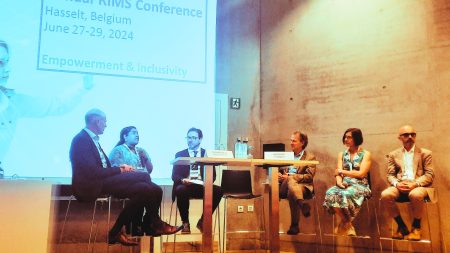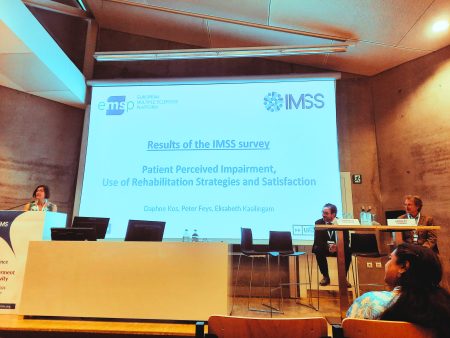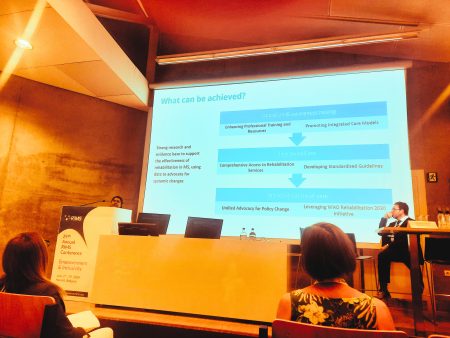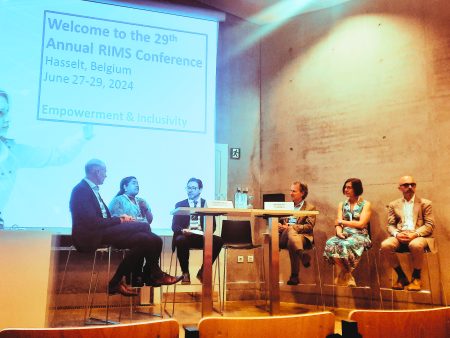
Preliminary Results of the Impact of Multiple Sclerosis Symptoms (IMSS) Survey Presented at RIMS Annual Conference
09.07.2024The 29th annual RIMS Conference held between 27 and 29 June 2024, marked a significant milestone for the MS community with the presentation of preliminary results from the Impact of Multiple Sclerosis Symptoms (IMSS) survey. The session focused on Patient Voice and Advocacy, highlighted the essential findings from this extensive research project led by the European Multiple Sclerosis Platform (EMSP).
Understanding the IMSS Project
The IMSS survey is a groundbreaking initiative aimed at assessing how various symptoms of Multiple Sclerosis (MS) impact the quality of life of people living with this condition. With the participation of 24 national MS societies from 22 countries and guided by MS experts across Europe, the survey has delved deep into the prevalence, severity, and management of MS symptoms. The goal is to shed light on the gaps in symptomatic care and provide personalised support to those affected by MS.

Professor Kos presenting the IMSS results at the RIMS conference.
Presentation Highlights
The session, chaired by Herbert Temmes and Dr. Giampaolo Brichetto, started with an engaging welcome followed by a series of insightful lectures tackling engagement and inclusivity. Key speakers, including Dr. Daphne Kos, Dr. Peter Feys, and Elisabeth Kasilingam, presented the preliminary results of the IMSS survey.
Dr. Daphne Kos and Elisabeth Kasilingam delivered a lecture on patient-perceived impairment among more than 17,000 people with MS, highlighting that fatigue, mobility impairment and cognitive impairment were reported as the top 3 most debilitating symptoms among participants.
Professor Kos elaborated on the medical professionals who are usually more involved in MS care and emphasized the importance of coordination between healthcare professionals across the MS Care Unit, especially for rehabilitation services. The results show that the overall satisfaction of people with MS regarding their symptom management is quite low, with only 50% of individuals feeling satisfied with how their symptoms are managed.

Elisabeth Kasilingam, CEO of EMSP, advocating for the use of evidence to have impactful change on the quality of life for people with MS.
Elisabeth Kasilingam, CEO of EMSP, met Professor Kos’s discussion with advocacy-focused action points that would allow the use of evidence, such as the findings of IMSS, to influence systemic change to improve the access to services for patients. Elisabeth emphasized the importance to highlight the needs and priorities of people with MS to policymakers, to ensure better and faster access allowing improved MS management but also better quality of life.
Elisabeth proposed areas for actions in this regard, including:
- Education and awareness: It is crucial to advocate for integrated care models as well as enhancing professional training and resources.
- Improved care: Standardised guidelines need to be developed in a way that can help ensure patients receive the same, equal, and high-quality healthcare standards wherever they are across Europe.
- Standardisation of care: There ought to be unified advocacy for policy change and professionals ought to leverage the WHO Rehabilitation 2030 initiative are.

Interactive roundtable addressing access to care, engagement with people with MS and the need for systemic changes.
Interactive round table
Following the lecture, an interactive round table provided a platform for further discussion and exchange of ideas. Participants included the presenting researchers and healthcare professionals, as well as an MS patient representative, an MS society representative and EMSP, all contributing to a rich dialogue on improving MS care.
During the discussion, Professor Kos mentioned that one person with MS she closely works with mentioned that ‘they feel lucky to have MS in Belgium’, continuing that ‘we should strive to have this reaction everywhere in Europe’ when addressing equal access of services and the access challenges faced by people with MS. Professor Kos also emphasised to use patient stories, feedback, and testimonies in the work of healthcare professionals. Professor Kos touched upon looking at the cost-effectiveness of investing in people with MS, their health, and their wellbeing as this will lead to a great return on investment with more people engaged in society.
Elisabeth also tacked the importance of investing in health:
‘We should encourage policymakers to invest in health, especially in times of crisis. We need to help policymakers understand the needs of people with MS and translate the data in registries and research to influence decision-making’…‘the time is now to work together, not in silos’
Professor Feys added that ‘the WHO 2030 rehabilitation initiative is now on the global political agenda to strengthen rehabilitation services worldwide to meet the increasing needs and demands. The WHO Rehabilitation 2030 initiative aims to enhance global access to high-quality rehabilitation services by integrating them into health systems, building capacity, promoting evidence-based practices, and addressing barriers to improve overall health and well-being by 2030’. Professor Feys stressed that we have to accelerate these efforts together by making ‘noise’ at both national and European levels, regarding the priorities and needs of people with MS.
The Road Ahead
The next step for the IMSS project is the development of the scientific publication, alongside country sheets for participating countries. The findings from this survey are expected to enhance advocacy efforts and influence policies changes, aiming to standardise and personalise MS symptom management across Europe.
By presenting these preliminary results at the RIMS annual conference, EMSP has taken a significant step towards bridging the gaps in MS care. The survey not only highlights the current challenges but also serves as a catalyst for future improvements in the quality of life for people with MS, underscoring the importance of patient engagement in research and policy-making. As we move forward, the insights gained from this survey will be instrumental in shaping a more inclusive and effective approach to MS care.
For more detailed information and updates on the IMSS project and its findings in 2024 and 2025, stay tuned to the IMSS project page, EMSPs website as well as EMSP’s newsletter, publications, and future conferences.
EMSP would like to thank the people with MS and their caregivers across Europe for participating in the IMSS research. EMSP would also like to thank the scientific working group, the national MS societies, the MS experts, GfK Spain, and the sponsors who are supporting the IMSS research in its different phases.
 Your Account
Your Account


